Indian History for Young Folks - Francis Drake |
The New England Indians
Only a few years before the Pilgrims landed at Plymouth, the coast of New England had been visited by a pestilence which had swept off nearly all the natives. A few Indians were seen hovering about soon after their arrival, but they quickly disappeared when pursued.
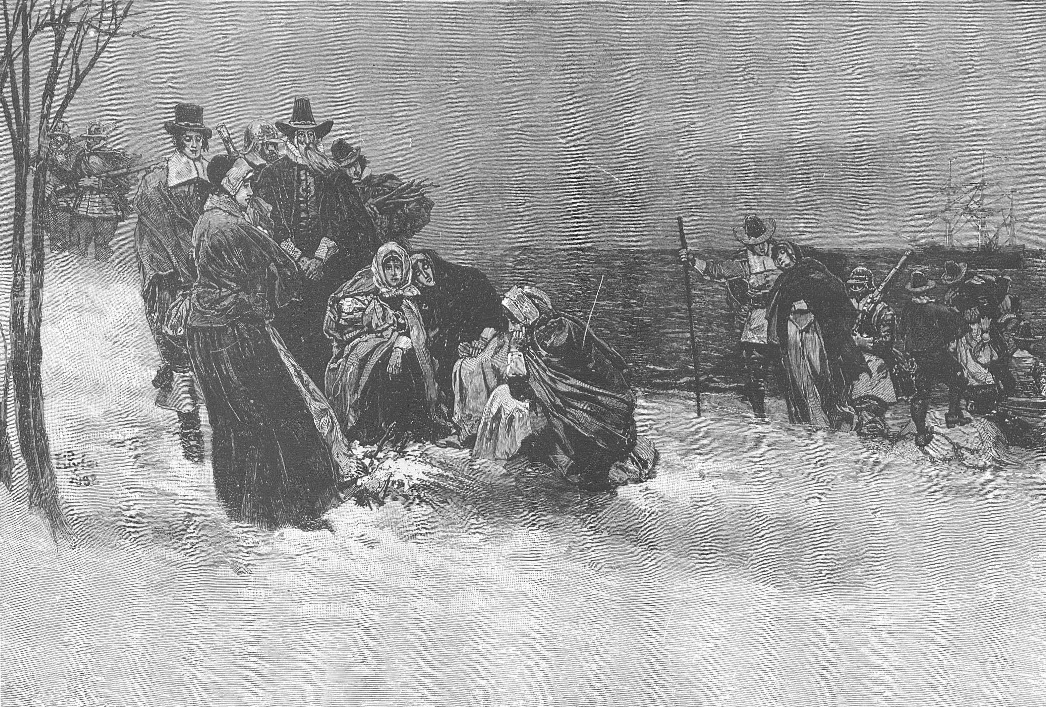 THE LANDING OF THE PILGRIMS. |
Their first encounter with the natives took place at Wellfleet, while they were exploring the coast for a suitable place for a settlement. Edward Winslow, afterwards governor of Plymouth colony, has left this account of it:
"All of a sudden," says Winslow, "we heard a great and strange cry. One of the company came running and said, 'They are men! Indians, Indians!' and withal their arrows came flying amongst us. The cry of our enemies was dreadful, especially when our men ran to recover their arms, which lay on the shore at a little distance, as by the good providence of God they did.
"In the mean time Captain Miles Standish made a shot, and after him another. Other two of us were ready, and there were only four of us which had their arms ready, and stood before the open side of our barricade, which was first assaulted. We called to them in the shallop to know how it was with them, and they answered,
"'Well, well!' every one; and 'Be of good courage.'
"There was a lusty man, and no whit less valiant, who was thought to be their captain, stood behind a tree within half a musket-shot of us, and there let his arrows fly at us. He was seen to shoot three arrows, which were all avoided, for he at whom the first was aimed stooped down and it flew over him. He stood three shots of a musket. At length one took, as he said, full aim at him, after which he gave an extraordinary cry, and away they went, all. We followed them about a quarter of a mile. Then we shouted altogether several times, and shot off a couple of muskets, and so returned. This we did that they might see we were not afraid of them nor discouraged.
"By the special providence of God none of these arrows hit us, though many came close by us and on every side of ns, and some coats that hung in our barricade were shot through and through."
 FIRST ENCOUNTER WITH THE INDIANS. |
Captain Miles Standish, who was so conspicuous in the military annals of Plymouth Colony, and who was the leader of as their warlike expeditions, had seen service, having fought the Spaniards in Holland. He was a fiery, hot-tempered little man, and afraid of nothing. Finding himself upon one occasion in company with Pecksuot, an Indian of great strength and courage, and suspected of plotting against the English, Standish, exasperated by his taunts and boasts of what he would do to the English, snatched the warrior's knife from his belt, and after a long struggle killed him with it. Others of Pecksuot's party were killed at the same time by Standish's companions. It was with reference to this affair that the Rev. John Robinson, father of the Plymouth church, said, "Oh that they had converted some before they had killed any."
Not long after the landing at Plymouth, Samoset, an Indian of the Wampauong tribe, who had picked up a little of their language from the English fishermen at Pemaquid, boldly entered the town, exclaiming, "Welcome, Englishmen!" This was the first Indian with whom the Pilgrims had spoken. In the name of his nation he invited them to possess the soil, the old occupants of which were no longer living.
 "WELCOME, ENGLISHMEN." |
Samoset is described as "a tall, straight man, the hair of his head black, long behind, only short before, none on his face at all. He was free of speech and of a seemly carriage." Being naked, they gave him a hat, a pair of stockings and shoes, a shirt, and a piece of cloth to tie about his waist. They learned a great deal from him about the Indians of the country. He came again to them, bringing five others with him. They were dressed in skins, most of them having long hose up to their groins, close made, and above, to their waists, another leather, "altogether like the Irish trousers. They are of complexion like our English gypsies Some trussed up their hair before with a feather broadwise, like a fan, another (had) a fox-tail hanging out." They professed to be friendly, and sang and danced after their fashion. Some had their faces painted black, four or five fingers broad, others in a different manner.
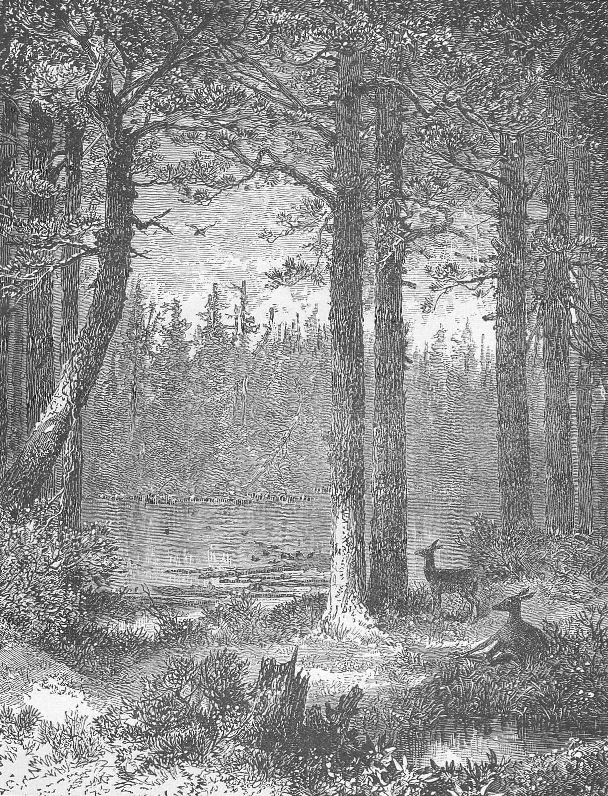 PLYMOUTH WILDERNESS. |
Soon afterwards another Indian named Squanto came to them. He was one of those who had been carried off by Captain Hunt, but escaped to England, and came back to his native land with Captain Dermer. He acted as interpreter to the colonists, taught them how to plant Indian-corn, where to take fish and procure other commodities, and, says Governor Bradford, "was a special instrument sent of God for their good, beyond their anticipation." After a while Squanto began to abuse his power and influence over the Indians, and received a sharp reprimand from Governor Winslow, who, however, admits that he was "so necessary and profitable an instrument as at that time we could not spare him." Hobbomuk was another of these natives who rendered invaluable aid to the pilgrims in the time of their early hardship and privation.
About twenty different tribes of Indians were found in New England. They were generally independent of each other, but sometimes united for mutual protection or for the purpose of making war. The chiefs of tribes or clans had such power only as they were entitled to by mental or physical superiority. The Pequots, Narragansets, Pokanokets, Massachusetts, and Pawtuckets were the principal tribes. There were also the Mohegans and Nipmucks, and the Abenakis of Maine. The Pequots, the most powerful, numbered about four thousand. Next came the Narragansets, in Rhode Island, with about one thousand. The Pokanokets, or Wampanoags, located in Plymouth colony, were much inferior to the Narragansets, whose sachem, Canonicus, was a chief of great ability.
To test the mettle of the white intruders, Canonicus, soon after they landed, sent them a bundle of arrows wrapped in a rattlesnake's skin. To this challenge the English replied by returning the skin filled with powder and ball, and with it a message from Governor Bradford, telling them that he desired peace, but if the Narragansets wanted war they might begin as soon as they had a mind to, and that he was prepared. This prompt defiance was enough, and no further hostile demonstrations were made by the Narragansets for many years.
The Massachusetts Indians, once a numerous people and often at war with the Narragansets, lived about the bay of that name. They comprised the Nausets, on Cape Cod; Pokanokets, or Wampanoags, between Plymouth and Narraganset Bay; Massachusetts; Pennacooks, on the northern frontier extending into New Hampshire; and the Nipmucks, in central Massachusetts, extending into Connecticut and Rhode Island. The Pawtuckets, also nearly destroyed by the great pestilence, were north of the Massachusetts tribes, and included the Pennacooks and other smaller clans. The language of all these tribes was substantially the same.
Massasoit, the Wampanoag sachem, paid an early visit to the Pilgrims, and was received with all the ceremony the condition of the colony allowed. He and his men were conducted to a new house, a green rug was spread upon the floor, and several cushions for Massasoit and his men to sit down upon. Then came the English governor, followed by a drummer and a trumpeter and a few soldiers, and after kissing one another all sat down.
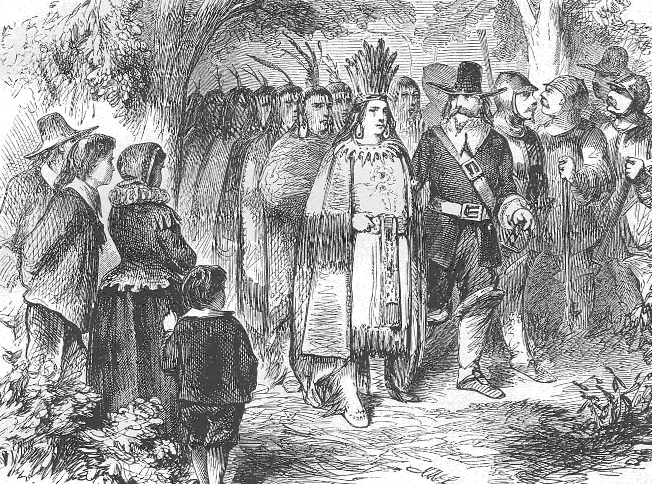 INTERVIEW WITH MASSASOIT. |
The chief was described at this time as "a very lustie man, in his best years, an able body, grave of countenance, and spare of speech. His face was painted of a sad red, and both face and head were well oiled, so that he looked greasily. A great chain of white bone beads was around his neck, on which hung a little bag of tobacco; this he used himself and passed to the English. In his bosom he carried a great, long knife. He marvelled much at our trumpet, and some of his men would sound it as well as they could. Some were naked, all were painted, and all were tall, strong men. The governor filled the king's kettle with peas, which pleased them well, and so they went their way." Massasoit's residence was at Mount Hope, which is now included in the town of Bristol, Rhode Island.
A treaty of friendship was soon made, and it was sacredly kept for more than forty years. Massasoit gained an important ally, for the powerful Narragansets were his enemies, and the English obtained security and the opportunity of a profitable trade.
 THE PALACE OF KING MASSASOIT. |
Some time afterwards, Edward Winslow and Stephen Hopkins visited the sachem at his home. Their account of this visit gives us an amusing glimpse of Indian domestic life. He had no victuals for them, and night coming on they retired supperless to bed. This article of furniture consisted of planks, laid a foot from the ground, and a thin mat upon them. "The chief and his wife occupied one end of the bed," says Winslow, "and we the other. Two of his men, for want of room, pressed by and upon us, so that we were worse weary of our lodging than our journey. What with bad lodging, the savages' barbarous singing (for they used to sing themselves asleep), vermin within doors and mosquitoes without, we could hardly sleep, and feared if we stayed longer we should lack strength to get home. When we departed, Massasoit was both grieved and ashamed that he could no better entertain us."
Massasoit, being at one time dangerously sick, sent word to his friends at Plymouth, who sent Winslow to him with medicines and cordials. These he administered successfully, and Massasoit, believing that Winslow had saved his life, was very grateful. Just as Winslow was about to depart he informed him of a plot by some of his sub-sachems to cut off the English, which he had refused to join and had used his efforts to prevent. Massasoit remained a fast friend to the colonists to the day of his death.
 EDWARD WINSLOW. |
The tribute of Hobbomuk to the dead chief shows how strong was his attachment to his master. "My loving sachem, my loving sachem!" he exclaimed with tender accent, "many have I known, but never any like thee." Then turning to Winslow, he said, "While you live on will never see his like. He was no liar, nor bloody and cruel like other Indians; he was easily reconciled towards such as had offended him, and he governed his people better with few blows than others did with many."
Captain John Oldham, while on a trading expedition at Block Island, was murdered by some Narraganset Indians. Oldham had been the first deputy from Watertown to the General Court, and was a prominent and highly-respected citizen. What led to the catastrophe, whether it was occasioned by a thirst for plunder or out of revenge for some injury from him, is not known.
Immediately after the murder, Captain John Gallup, of Boston, who with two sons and a servant, "a stout, strong fellow," was in a larger vessel, also trading with the Indians near Block Island, discovered a vessel making off from the shore. He saw that she was awkwardly handled and appeared full of Indians. Believing her a piratical craft, Gallup determined upon her capture.
Having the advantage of a good breeze he made all sail towards her, and struck her on her quarter with such force as almost overset her. This frightened the Indians so much that six of them jumped into the sea and were drowned. Gallup repeated this mauœuvre successfully, and then with his fire-arms drove every remaining Indian below. Meanwhile four or five more of them leaped overboard, and Gallup then boarded and captured her. Oldham's body was found still warm, the head split open and the feet and hands chopped off. Two boys taken with Oldham were rescued uninjured. This is the first American sea-fight on record.
In order to ascertain and punish the instigators of this murder, the English sent a deputation to Canonicus, the Narraganset sachem, who was well known to be "a just man and a friend to the English." They observed in him "much state, great command over his men, and much wisdom in Ins answers, clearing himself and his neighbors of the murder, and offering assistance for revenge of it, yet upon very safe and wary conditions."
An expedition under Governor Endicott was sent against the Block Island Indians and the Pequots, the perpetrators of Oldham's murder, which ravaged their villages and destroyed their crops, and on its return doing the same along the Narraganset shore. Forty of the natives were killed and wounded in a skirmish. At Saybrook, near the mouth of the Connecticut, a fort had been built, and Captain Lion Gardner placed in command. He condemned this unwise action of Endicott in a letter to Governor Winthrop of Massachusetts, in which he says, "You came hither to raise these wasps about my ears, and then you will take wing and flee away." He and his little garrison of less than one hundred had all they could do, he said, "to fight Captain hunger." He was right; so far from being overawed, the Pequots sought the alliance of their neighbors the Narragansets and the Mohegans; a state of constant hostility was produced, and the fort was for a long time beleaguered. The persevering energy and intrepidity of one man caused the dissolution of this formidable conspiracy.
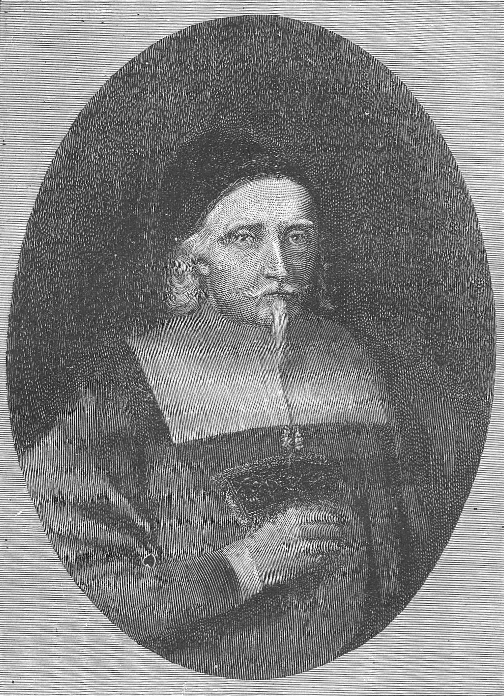 GOVERNOR ENDICOTT. |
When Roger Williams, the famous apostle of civil and religious liberty in America, was in midwinter exiled from Massachusetts, he fled to Rhode Island, where he was kindly received by the Indians. He was well acquainted with their language, and while a resident of Plymouth had often been the guest of the neighboring sachems. He was welcomed to the cabin of Massasoit, and "the barbarous heart of Cauonicus loved him as his son to the last gasp." "The ravens," said Williams, "fed me in the wilderness." He requited the hospitality of the red men by being ever after their friend and counsellor; their "pacificator when their rude passions were inflamed, and their advocate and protector" whenever wrong was offered them.
At the earnest request of the authorities of Massachusetts, who had just before driven him into exile, Williams endeavored to prevent the Pequots from obtaining the alliance of the Narragansets. At the hazard of his life he hastened to the home of the Narraganset sachem. "Three days and three nights," he says, "my business forced me to lodge and mix with the bloody Pequot ambassadors, whose hands and arms methought reeked with the blood of my countrymen, and from whom I could not but nightly look for their bloody knives at my own throat also. God wonderfully preserved me and helped me to break in pieces the Pequots' negotiations and designs."
The Pequots kept on plundering and murdering the settlers until in May, 1637, a force of seventy-seven men, under Captains Mason and Underhill, accompanied by four hundred Narragansets and Mohegans, was sent against them. Mason was a veteran soldier who, with Miles Standish and Underhill, had learned the art of war in Belgium, under that renowned leader the Prince of Orange.
Of the Indian tribes of New England the Pequots were the most formidable. All the other tribes were afraid of them. They were settled near the Thames River in Connecticut, and could muster seven hundred warriors. In his prosperous days, Sassacus, their sachem, had no less than twenty-six sachems under him, and reigned supreme from Narraganset Bay to the Hudson River, and over Long Island. Seeing the English settlements multiplying around him, and fearing that sooner or later the English would be in possession of the hunting grounds of his tribe, he resolved to make war upon them.
As the English vessels sailed by the mouth of the Thames, the Pequots, who had assembled in large numbers, supposed they had nothing further to fear. They had no suspicion that the English captain was executing a flank movement, so as to attack them from an unexpected quarter. But so it was. When Mason's Indians got near the hostile fort, though they had boasted of what they would do, their fears of the terrible Sassacus got the better of them, and they kept at a safe distance until the affair was over. When Uncas was asked how many of his men would run away when the battle begun, the answered, "Every one but myself." The result justified his prediction.
Mason landed his men near the village of Cononicus, whose permission he obtained to march across his territory and attack the Pequots. The old thief told Mason that his force was much too small for the big job he had undertaken. After a tedious march, Mason's men reached Pawcatuck Ford (now Stouington), weary, hungry, and footsore. Resting awhile, they continued their march, with Incas and Wegna, a recreant Pequot, for guides, and one hour after midnight encamped on the head-waters of the Mystic River.
Although Mason had resolved to attack both Pequot forts, which were four or five miles apart, at the same time, yet the fatigue and privations of his men, who had been two days on the march without provisions, and suffering from the extreme heat of the weather, determined him to confine his attack to the nearest fort. Reposing a few hours, his men took up the line of march and arrived before the fort, which was two miles distant, about two hours before daybreak. The moon was shining brightly when they reached the foot of the eminence on which the fort was situated.
Fort Mystic, the principal Pequot stronghold, was a palisade work that stood at the top of a hill in the present town of Groton. It covered an area of twenty acres, and was so crowded with wigwams that the English "wanted foot-room to grapple with their adversaries." Its two entrances were at opposite points, and were blocked up with boughs or baskets. The wigwams were ranged in two rows, and were covered with matting or thatch.
The Indians had spent the night in dancing, singing, and rejoicing at their supposed escape from invasion. Asleep in their wigwams, the barking of a dog just at daybreak was their first intimation of danger. The cry, "Owanux Owanux!" (Englishmen) was raised.
Removing the obstacles, Mason, with sixteen followers, entered the fort at one end, while Underhill did the same at the other, and before the startled sleepers had time to oppose them, the work of destruction had begun.
Although surprised, the Indians defended themselves as well as they could with their bows and arrows, but they were quickly overpowered. Many of them sought shelter in the wigwams, covering themselves with the thick mats, from which it was almost impossible to dislodge them. The sword and bullet doing the work too slowly, Mason seized a firebrand, exclaiming, "We must burn them!" A warrior drew his bow to send an arrow through his heart, but a soldier cut the bowstring with his sword. The combustible cabins were soon in a blaze, and five or six hundred of the miserable natives perished in the flames. Those who tried to escape by climbing over the palisades were shot down. Of the English, two only had fallen and twenty were wounded. Lieutenant Bull had a narrow escape, an Indian arrow being stopped by a piece of hard cheese in his pocket.
This victory was regarded by the Puritans as a signal evidence of the goodness of God. "The Lord was pleased," says Captain Mason in his narrative, quoting the Psalmist, "to smite our enemies in the hinder parts, and to give us their land for an inheritance."
The rigor displayed by the settlers in this first great blow inflicted on the Indians struck terror into them and secured a long season of peace. It was indeed a terrible massacre, involving helpless women and children, as well as men. The early colonial laws had forbidden the sale of fire-arms to the Indians, and till they possessed them they were never formidable in battle.
The remainder of the tribe were soon hunted down. A portion of them fled for protection to the Mohawks, who treacherously beheaded Sassacus and five other sachems. "A nation had disappeared from the family of men." Their fate drew these lines from the poet Dwight:
|
"Indulge, my native land, indulge the tear That steals impassioned o'er a nation's doom; To me each twig from Adam's stock is near, And sorrows fall upon an Indian's tomb." |
Rumors of a general conspiracy of the Indians caused the colonies of Massachusetts, Plymouth, Connecticut, and New Hampshire to unite in a confederacy for mutual protection against them. Its affairs were managed by two commissioners from each colony.
One of the ablest of the New England Indians was Miantonomo, a nephew of Canonchet and chief of the Narragansets. Had he not been made the victim of the cruel policy of the English, his name would have been justly held by them in high estimation. Miantonomo was tall and well made, "subtle and cunning in his contrivements, as well as haughty in his designs." He was requested to come to Boston to clear himself of the charge of conspiracy against the colonists, and he did so. The court assembled, and before his admission," says Governor Winthrop, "we consulted how to treat with him, for we knew him to be a very subtle man, and agreed that none should propound anything but the governor"—a striking tribute from one of the wisest and ablest of the colonists to the sagacity and wisdom of an unlettered Indian.
Miantonomo would not proceed with any business but in the presence of some of his own counsellors, that they on their return might bear witness to his people of all his words. He was very deliberate in his answers, and showed great ingenuity as well as a clear understanding of the principles of justice and equity. He very properly called upon the English to produce his accusers. As they had proceeded wholly on vague rumors, this demand placed them in an awkward predicament. He told them that if the charges were proved against him, he came prepared to suffer the consequences, and now, if he had been accused falsely, he expected the authors of the accusation to be subjected to the same penalty. Certainly this was but just. He also told the court that he believed Uncas, the Mohegan sachem, to be at the root of all the mischief, and that he was doing his best to embroil the Narragansets and the English. And so, in fact, it was. On taking leave of the governor, a coat was given to him and to each of his counsellors.
It was the policy of the English to pit one tribe against another for their own protection, and so Uncas, the Mohegan chief, who was disposed to conform to their wishes, was used by them to balance the power of Miantonomo. This chief had suffered numerous indignities from the English, which rankled in his breast, and hated Uncas as the cause of them, and also as a traitor to his race.
Suddenly, and in disregard of a treaty, he collected one thousand warriors and fell upon the Mohegans. His rashness and impetuosity caused his defeat, and he himself was made a prisoner. It seems that in this fight Miantonomo wore a suit of armor or coat of mail loaned him by an English friend, Samuel Gorton, and that, when it became necessary to retreat, it so impeded his motions as to cause his capture. His life was forfeited by Indian law, but Uncas took him to Hartford and asked the advice of the Commissioners of the United Colonies as to what was to be done with him.
The commissioners replied that they saw no reason for mercy. Five of "the most judicious" elders of the church were also consulted, and they agreed that he ought to suffer death, and he was accordingly put to death by Uncas. Thus was this remarkable man sacrificed to the envy of a rival chief and to the supposed political interest of the colonies. His execution took place at the spot, in the eastern part of the town of Norwich, Connecticut, now called Sachem's Plain, where a monument has been erected to his memory, upon which is the simple inscription:
1643
John Eliot's missionary labors among the Indians of New England began at Nonantum, and were continued at various places for more than thirty years. He acquired the Indian language and with infinite labor translated into it the Bible, the catechism, and other devotional works, distributing them among them. The natives were taught to read and write, and soon there were fourteen places of Praying Indians, as they were called. In 1673 six Indian churches had been gathered. A death-blow was given to these pious labors by Philip's war. Some of these Indians joined in it with their countrymen, and this so exasperated the English, that the remainder of those who were faithful to them were with difficulty rescued from destruction. The treatment they then received created a breach between them and the English that was never healed. Their number rapidly diminished, and they finally disappeared.
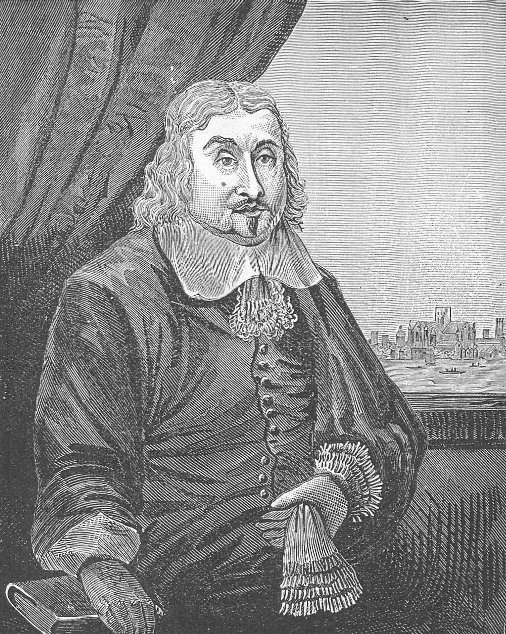 JOHN ELIOT. |
Eliot introduced among his converts industry, cleanliness, and good order. He drew up for them a simple code, punishing idleness, filthiness, licentiousness, and cruelty to women. A court was established at Nonantum, over which presided Waban, an Indian justice of the peace. There was no circumlocution in his office. Justice was speedily and impartially administered. Here is a specimen warrant: "You, you big constable, quick you catch um Jeremiah Offscow, strong you hold um, safe you bring um afore me, Waban, Justice Peace." His sagacious and sententious judgment in a case between some drunken Indians would do no discredit to a much higher civilization than that at Nonantum: "Tie um all up," said he, "and whip um plaintiff, and whip um 'fendant, and whip um witness."
Uncas, the Mohegan sachem, was originally a Pequot, and one of the twenty-six war captains of that famous but ill-fated nation. Setting up for himself at the head of the Thames River, near the present city of Norwich, he was politic enough to court the favor of the English, and in 1637 joined with them in their war upon the Pequots. In the pursuit that followed the Fort Mystic fight his men captured a Pequot chief of distinction. Cutting off the captive's head, Uncas placed it in a conspicuous spot near the harbor, where it remained many years. This circumstance gave to Guilford harbor the well-known name of "Sachem's Head."
 JOHN ELIOT PREACHING TO THE INDIANS. |
Summoned to Boston, upon the charge of shielding some of the conquered Pequots, he appeared before Governor Winthrop, and laying his hand upon his heart said:
"This heart is not mine, but yours. I have no men; they are all yours. Command me any difficult thing, I will do it. I will not believe any Indian's word against the English. If one of my men should kill an Englishman I will put him to death, were he ever so dear to me."
"So the governor gave him a fine red coat," says the chronicle, "and defrayed his and his men's diet, and gave them corn to relieve them homeward, also a letter of protection, and," continues the record, "he departed very joyful." Uncas was still living, at a great age, in 1680.
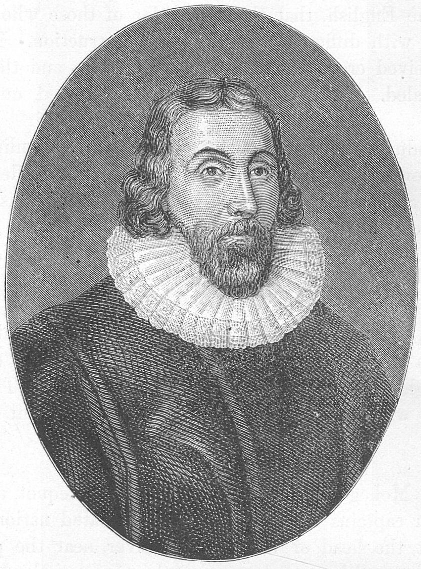 GOVERNOR WINTHROP. |